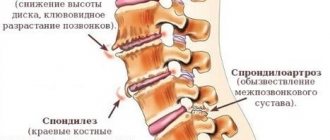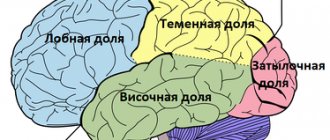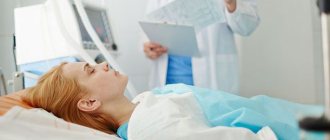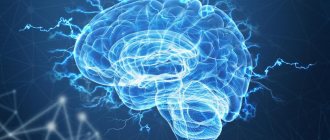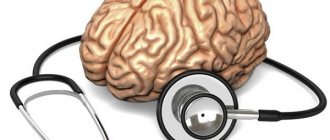Treatment of nervous system damage in a child
Some children are so worried on the eve of exo-amen that they literally get sick.
Drugs for the treatment of the nervous system
1.
Anacardium is a drug for the treatment of the nervous system.
- As soon as a child sits down to write, he loses all self-confidence and remembers absolutely nothing.
2.
Argentum nitricum is a drug for the treatment of the nervous system.
- On the eve of the exam, the child is hurried, excited, irritable and nervous.
- Diarrhea on the eve of an exam.
- The child may ask for sweets.
3.
Gelsemium is a drug for the treatment of the nervous system.
- Weakness and trembling on the eve of an important event or exam.
- Diarrhea is possible.
4.
Picric acid is a drug for the treatment of the nervous system.
- For good students who have studied hard but can no longer continue to study - they would even like to throw away their textbooks.
- The child is afraid that he will forget everything during the exam.
- The child is very tired from studying.
Potential and number of doses:
One dose of 30C the evening before the exam, one in the morning and one just before the exam.
Risk factors
The development of perinatal encephalopathy in the fetus and child can lead to
- chronic maternal intoxication and chronic diseases
- infectious diseases during pregnancy
- disorders of uteroplacental blood flow, placental abruption, fetoplacental insufficiency
- Umbilical cord entanglement
- maternal diseases associated with metabolic disorders (diabetes mellitus, phenylketonuria, etc.)
- severe toxicosis;
- pathological course of labor, use of obstetric aid, weakness of labor, rapid labor
- prematurity;
- Fetal malformations
There are several main mechanisms of damage to the central nervous system:
- Acute hypoxia
- Chronic hypoxia
- Injury
- Hemorrhage
- Toxic effects
Symptoms of nervous system damage in a child
Most diseases of the nervous system at an early age are accompanied by delayed psychomotor development. When diagnosing them, the assessment of the presence of neurological syndromes, as well as the identification of lesions of the nervous system, is of key importance.
Hypoexcitability syndrome is a symptom of damage to the nervous system
Hypoexcitability syndrome is characterized by low motor and mental activity of the child, a long latent period for the occurrence of all reflexes (including innate ones), hyporeflexia, and hypotension. The syndrome occurs predominantly due to dysfunction of the diencephalic-limbic parts of the brain, which is accompanied by vegetative-visceral disorders.
Hypoexcitability syndrome develops with perinatal brain damage, some hereditary and congenital diseases (Down's disease, phenylketonuria, etc.), metabolic disorders (hypoglycemia, metabolic acidosis, hypermagnesemia, etc.), as well as with many severe somatic diseases.
Hyperexcitability syndrome - a symptom of damage to the nervous system
Hyperexcitability syndrome is characterized by motor restlessness, emotional lability, sleep disturbance, increased innate reflexes, and a decreased threshold for convulsive readiness. It is often combined with increased muscle tone and rapid neuropsychic exhaustion. Hyperexcitability syndrome can develop in children with perinatal pathology of the central nervous system, some hereditary fermentopathies, and metabolic disorders.
Intracranial hypertension syndrome is a symptom of damage to the nervous system
The syndrome is characterized by increased intracranial pressure, often combined with dilation of the cerebral ventricles and subarachnoid spaces. In most cases, there is an increase in the size of the head, divergence of cranial sutures in infants, bulging and enlargement of the large fontanelle, and disproportion between the cerebral and facial parts of the skull (hypertensive-hydrocephalic syndrome).
The cry of such children is piercing, painful, “cerebral.” Older children often complain of a symptom such as headache, although this complaint is not specific to this syndrome. Damage to the VI pair of cranial nerves, the “setting sun” symptom (the appearance of a clearly defined strip of sclera between the upper eyelid and the iris, which creates the impression of the eyeball “falling down”), spastic tendon reflexes are late symptoms of persistent intracranial hypertension.
Percussion of the skull sometimes reveals the sound of a “cracked pot.” Sometimes horizontal, vertical or rotatory nystagmus appears.
CNS lesion disability
Advice from lawyers:
1. Can I get disability due to organic damage to the central nervous system (birth injury)?
1.1. Hello, the disability group is established as a result of a medical and social examination depending not only on the diagnosis, but also on the basis of a comprehensive assessment of the condition based on the analysis of clinical, functional, social, professional, labor and psychological data based on criteria approved by the Ministry of Health and Social Affairs development; a referral to MSE can be given by a medical institution, a regional branch of the Pension Fund and a social protection authority; If these organizations refuse the referral, then they issue a certificate confirming the fact of refusal and you can contact the ITU bureau yourself. With respect and readiness to help, STANISLAV PICHUEV.
Did the answer help you?YesNo
1.2. Contact the medical institution at your place of residence, a medical commission and get the necessary advice on the issue that interests you.
Did the answer help you?YesNo
1.3. The decision to assign you a disability group is made by MSEC; it is based on clinical studies, the degree of disability, time spent in hospital treatment and many other parameters. This is a question not for lawyers, but for doctors. You can successfully resolve your issue with legal assistance. Thank you for using the site's services!
Did the answer help you?YesNo
Consultation on your issue
8
Calls from landlines and mobiles are free throughout Russia
2. Is disability due to organic damage to the central nervous system (birth injury)?
2.1. Hello. .You may get a disability.
Did the answer help you?YesNo
3. Is there a disability group for a disease with a diagnosis of “Organic damage to the central nervous system of moderate origin”?
3.1. Hello! To do this, you need to contact not lawyers, but your local therapist.
Did the answer help you?YesNo
4. Can my 7-year-old child be given a disability? Neurological diseases: organic lesion of the central nervous system of mixed type, benign intracranial hypertension, subcompensation, REP. Speech therapy: motor alalia.
4.1. This issue is resolved by a medical and social examination. If there are grounds, the child will be recognized as a child with a disability. The disability group is established upon reaching 18 years of age.
Did the answer help you?YesNo
5. The child has an organic lesion of the central nervous system. I'm sitting at home, the child is difficult. I can apply for disability.
5.1. Hello, Lawyers are not doctors and will not answer such questions and are not competent. Ask your doctor for a referral to MSEC. I wish you good luck and all the best!
Did the answer help you?YesNo
6. My girl was diagnosed at 2 months old. consequences include hemorrhage and leukomalacia. Perinatal damage to the central nervous system. Chance for a child of 8 months. I wanted to clarify whether we are entitled to disability? Since our neurologist says it’s not supposed to, but I know many people with this diagnosis, do they all have a disability?
6.1. Request a referral commission.
Did the answer help you?YesNo
7. The child was given a conclusion: organic damage to the central nervous system with severe mental retardation, level 1 expressive speech disorder, and behavioral disorder. Will they be given disability with such a conclusion?
7.1. Tatyana, you can count on disability, but the final decision will be made by an expert commission. You can appeal the commission's decision to a higher commission or to court.
Did the answer help you?YesNo
8. My son is diagnosed with residual organic damage to the central nervous system, do we have the right to disability? Although, I think that the question is not for you...
8.1. To establish disability, you must contact social services. protection of the population at the registration address. Based on your request, a commission is formed that will determine whether there is a need to qualify for disability and issue benefits and in what amount. If you have any questions, call 89255978445, write to [email protected] any day from 10.00 to 20.00
Did the answer help you?YesNo
9. Doctors put my child at 1.3, organic damage to the central nervous system, vasoconstriction, MVP syndrome, the child is premature, very developmentally delayed, weight 7200, height 73, does not chew, does not walk, is just starting to sit, is there a disability status?
9.1. MSEC resolves this issue, contact your primary physician for a referral.
Did the answer help you?YesNo
10. Is disability due to residual organic damage to the central nervous system, erased dysarthria, syndrome of autonomic dysfunction of the central nervous system, f07.8
10.1. This is decided only by the medical commission and we are lawyers.
Did the answer help you?YesNo
11. My child has an organic lesion of the central nervous system, an emotionally labile disorder, and good-quality intracranial hypertension syndrome. Does the child have a disability category?
11.1. Hello, you need to register for disability, for this you need to contact a neurologist at your clinic, your neurologist should send you to an ITU in neurology. After receiving the ITU, contact the VTEK commission, which determines disability. Good luck to you!
Did the answer help you?YesNo
12. My daughter has been diagnosed since birth with severe perinatal hypoxic-ischemic damage to the central nervous system and pseudobulbar syndrome. At what age can you apply for disability?
12.1. Good afternoon You can start registering for disability at any time, you need to take a referral to go through the ITU medical commission, the commission will already decide the issue regarding disability. Contact your doctor about this. Sincerely!
Did the answer help you?YesNo
13. Is a child with resectional lesions of the central nervous system, hyperthesia-hydrocephalic syndrome, motor impairment syndrome, or ataxic syndrome eligible for disability?
13.1. Oksana, good afternoon! The conditions for recognizing a citizen as disabled are: a) impairment of health with a persistent disorder of body functions caused by diseases, consequences of injuries or defects; b) limitation of life activity (complete or partial loss by a citizen of the ability or ability to carry out self-service, move independently, navigate, communicate, control one’s behavior, study or engage in work); c) the need for social protection measures, including rehabilitation and rehabilitation. These circumstances are determined by ITU specialists. If you do not agree with the ITU decision, you have the right to appeal it.
Did the answer help you?YesNo
Consultation on your issue
8
Calls from landlines and mobiles are free throughout Russia
14. The child is diagnosed with mild mental retardation with behavioral disorder, a degree between moderate and severe debility - according to the old classification, expressive speech disorder, early damage to the organic central nervous system. Can I count on my child being disabled?
14.1. Hello, with this question, you’d better turn to doctors or lawyers. If there is a refusal from the Doctors, you can always appeal it to the prosecutor's office.
Did the answer help you?YesNo
14.2. Disability is determined by diagnoses by doctors, but not by lawyers. Contact your pediatrician, if there are reasons, he will refer you to a commission.
Did the answer help you?YesNo
14.3. Good evening. You need to obtain a referral from your attending physician to undergo a medical and social examination to obtain a disability. Have a nice pleasant evening.
Did the answer help you?YesNo
14.4. Good day! THIS question falls within the competence of ITU only, FROM you - the more complaints, the more disability you receive. Good luck to YOU! Always happy to help.
Did the answer help you?YesNo
15. A child was born with esophageal atresia with a lower tracheoesophageal fistula (Q 39.1). Complications after surgery: esophageal wall. Concomitant diagnosis: LLC (4.2 mm). Perinatal lesion of the central nervous system of mixed origin. Stage 1 IVH. Muscular dystonia syndrome. Retinal angiopathy. Now the girl is 2 months old. Is a child with this diagnosis entitled to a disability?
15.1. Hello! The disability group is determined by the ITU. Citizens and officials guilty of violating the rights and freedoms of people with disabilities bear responsibility in accordance with the legislation of the Russian Federation. Disputes regarding the determination of disability, the implementation of individual rehabilitation programs for people with disabilities, the provision of specific social protection measures, as well as disputes concerning other rights and freedoms of people with disabilities are considered in court.
Did the answer help you?YesNo
16. My son is now 1 year and 3 months old. We are diagnosed with perinatal damage to the central nervous system in the form of hydrocephalic syndrome, zpr, zrr, descending optic atrophy. Can I give him disability? The child does not speak at all and does not walk independently. The developmental psychologist puts our age at 9-10 months.
16.1. Yes, you can do it.
Did the answer help you?YesNo
16.2. You need to contact your pediatrician and undergo an MSA. They should give you a direction. Of course, starting from this year, the requirements for disability are very strict. But we have to try. There are reasons.
Did the answer help you?YesNo
17. Good afternoon. Please tell me, a very premature baby: recurrent bronchitis ICD 10, the arterial duct was closed, a foreign body remained, because of this there is a slight deformation of the chest, damage to the central nervous system, severe myopia.. (Soon we will be 6).. Why can’t we have such a set? get disability?
17.1. And who told you that it is impossible? When you turn 6 months old, contact ITU.
Did the answer help you?YesNo
18. My child is 1 year 5 months old. The disease is perinatal encephalopathy, hypoxic damage to the central nervous system, delayed psychomotor and speech development. The child does not walk or talk. Are we entitled to disability?
18.1. Disability issues are resolved only by ITU. If you do not agree with the decision of the ITU bureau, then you or your legal representative can appeal its decision to the main ITU bureau of the subject of the Federation where you live, or to the Federal Bureau of ITU. or court. Decree of the Government of the Russian Federation dated 02/20/2006 N 95 (as amended on 08/06/2015) “On the procedure and conditions for recognizing a person as disabled” (with amendments and additions, entered into force on 01/01/2016)
Did the answer help you?YesNo
19. The diagnosis made by a neurologist of organic damage to the central nervous system, is this a criterion for disability? The neurologist denies this fact...
19.1. Hello! The disability group is determined by the ITU. Citizens and officials guilty of violating the rights and freedoms of people with disabilities bear responsibility in accordance with the legislation of the Russian Federation. Disputes regarding the determination of disability, the implementation of individual rehabilitation programs for people with disabilities, the provision of specific social protection measures, as well as disputes concerning other rights and freedoms of people with disabilities are considered in court.
Did the answer help you?YesNo
19.2. Determination of disability is made according to medical data. According to testimony, lawyers do not resolve this issue, alas.
Did the answer help you?YesNo
19.3. The decision to refer to MSEC is made by the attending physician based on examinations. If you do not agree with the doctor’s decision, appeal it in court.
Did the answer help you?YesNo
19.4. Disability is placed in a complex of social physiological reasons. The latter of which should hinder the realization of social needs.
Did the answer help you?YesNo
20. Please, can I get a disability with a diagnosis of the consequences of early organic damage to the central nervous system and cerebral trauma, severe cerebrasthenic syndrome with migraine-like paroxysms, syncope? I tried to make a group several times, but they always refused.
20.1. Hello! You can appeal the refusal in court. The disability group is determined by the ITU. Citizens and officials guilty of violating the rights and freedoms of people with disabilities bear responsibility in accordance with the legislation of the Russian Federation. Disputes regarding the determination of disability, the implementation of individual rehabilitation programs for people with disabilities, the provision of specific social protection measures, as well as disputes concerning other rights and freedoms of people with disabilities are considered in court.
Did the answer help you?YesNo
My daughter has been disabled since childhood. She is 1.8 years old. Diagnosis: Hirschsprung's disease, a calostomy was applied, the intestines do not empty,
Should I be given disability if I have SLE with damage to the central nervous system and joints? CKD stage 2. Secondary ABS. Chronic cerebral ischemia?
My child was initially given a disability with a diagnosis of mental retardation, now we have a diagnosis
Is my child entitled to a disability with a diagnosis of organic damage to the central nervous system with autistic manifestations, mild delay in speech development?
My 8-month-old child cannot sit up, crawl, or hold her back and head steady.
Is it possible to register a disability for a child if he suffered viral encephalitis within six months and we are registered with a diagnosis of open mixed hydrocephalus,
The child was diagnosed with a patent foramen ovale. The child is registered with a neurologist at home: consequences of perinatal damage to the central nervous system.
My disabled child turns 18 in a month. At the age of 2, we were granted disability.
Having a second permanent disability group, he was diagnosed with anxiety-depressive disorders due to damage to the central nervous system.
I adopted a child. In Ufa they made the following diagnosis: F06.68 consequences of early organic damage to the central nervous system of complex origin (heredity, PAP)
I visited a neurologist with my child, we are on disability until the age of 18 with a diagnosis of Organic damage to the central nervous system,
Treatment and rehabilitation for PCNSL
Treatment of PPCNS begins with measures to prevent it.
Before birth, mandatory monitoring of the fetal condition is carried out and, if any abnormalities are present, treatment is immediately prescribed. In severe cases, surgical delivery may be required.
During the perinatal period, children with suspected PPCNS are observed by a neonatologist. At this stage, intensive therapy is carried out, the child is in a specialized department.
After stabilization of the condition, in the absence of a threat to life, the recovery process begins - rehabilitation. The goal of this stage is to minimize the effects of brain damage.
At this stage, medications are used that improve trophic processes in brain tissue, massage to normalize tone and stimulate tactile and proprioceptors, exercise therapy and kinesiotherapy (Bobat, Vojta, etc.) to develop motor skills and prevent the development of contractures, it may also be necessary the use of special orthopedic devices to prevent or correct limb deformities. Botulinum therapy can be used to reduce tone.
The most important thing is to remember that all rehabilitation activities are carried out for one purpose - to provide an opportunity for the child to develop skills and make him as independent as possible in adulthood. Each child’s body is unique and the result of recovery in each specific case is very difficult to predict, however, the correct and consistent use of rehabilitation methods and techniques allows you to achieve maximum results. Cases of partial or complete restoration of central nervous system functions after PCNSL are far from uncommon.
